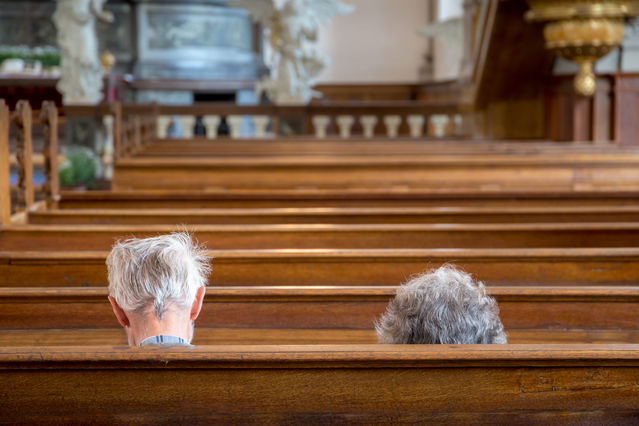Spirituality
Spirituality, Not Just Religion, May Be Declining
Should we be worried that young adults will lose purpose, meaning and morality?
Posted February 20, 2020 Reviewed by Matt Huston

“Spiritual” is a word that used to be quite uniformly regarded as having strong positive connotations. It suggested an elevated level of awareness and an ability to transcend the mundane and materialistic concerns of daily life. To declare yourself a non-spiritual person used to be tantamount to saying you are shallow and unreflective.
With the steady decline of institutional religious affiliation in the West in the last few decades, many people chose to describe themselves as “Spiritual but Not Religious.” The term SBNR is said to have taken off in the early 2000s when online dating first became popular: “‘Spiritual-but-not-religious’ became a nice category that said, ‘I’m not some kind of cold-hearted atheist, but I’m not some kind of moralizing, prudish person, either. I’m nice, friendly, and spiritual—but not religious,’” as Matthew Hedstrom, professor of religion at the University of Virginia, put it.1 The notion of spirituality without institutional religion probably had its main roots in 1960s counter culture and in 1980s New Age Spirituality. While still enjoying enormous popularity, New Age Spirituality (alternately referred to by terms such as “Mind-Body-Spirit”), has increasingly become ridiculed by younger generations.
Today, more and more people, especially young people, forgo the spiritual label. For many, the word carries connotations of believing in spirits or ghosts and things supernatural or paranormal. It carries connotations of being unscientific, of being governed by intuition (another word no longer regarded as an unqualified compliment)—a person governed by emotion rather than rationality.
Belief in God or a Higher Power, the ultimate of supernatural beliefs, is increasingly eschewed too, and especially by younger people.
Decline of both institutional religious affiliation and belief in God, in the U.S.
It is now old news that the level of religious non-affiliation is increasing in the West, including in that most anomalously religious of Western countries, the U.S. The percentage of Americans who said they are religious “nones” (people who describe their religious identity as atheist, agnostic or “nothing in particular”) rose to 26% by 2019, up from 17% in 2009.2 It is also now well-known that this trend is strongest among younger adults. Among millennials (born between 1981 and 1996) the percentage of “nones” is 40%, compared with 25% among Gen X (born between 1965 and 1980), 17% among Baby Boomers (1946-1964,) and 10% among the Silent Generation (1928-1945).
But until now it has been widely assumed that most of those people who were no longer sitting in the pews were “Spiritual but not Religious” (SBNR)—disinterested in or disenchanted with institutional religion but still believing in a Higher Power, charting their own alternative paths to connect with the transcendent. However, newer data suggests that spirituality itself, or more specifically belief in a Higher Power—which is foundational to most forms of spirituality—is declining, and especially in younger generations.
To be sure, many nonreligious Americans do still self-identify as SBNR: a 2017 PRRI study classified 18% as spiritual but not religious.3 But that study also found that 31% are neither spiritual nor religious. And the study found that nonreligious Americans of all kinds (whether spiritual or non-spiritual) are substantially younger than religious Americans.
A 2017 Pew study found that 19% of Americans don’t believe in God, and a much larger percentage, 44%, don’t believe in a biblical God. The 19% were divided between those who do believe in some kind of vague higher power or spiritual force (9%) and those who don’t believe in any kind of higher power (10%). All these numbers, including the 10%, represent large increases from previous decades, and there are good reasons to suspect that even these numbers are underestimates (see footnote 4).
Jean Twenge, in an analysis of 2014 nationally representative General Social Survey (GSS) data, found that nearly twice as many Americans indicated they did not believe in or had doubts about God in 2014 compared with the late 1980s (22% vs. 13%) (in 2018 this number had risen to 24%5). This trend was most marked among young adults: Among 18-to-29-year-olds, 30% had serious doubts by 2014, compared with 12% in the late 1980s (and in 2018 this number had risen to 32%).6 The trend also appeared in the youngest generation, Gen Z (also called iGen). Twenge notes that because this data goes back several decades, it seems that Millennials and Gen Z are not abandoning religion just because they are young—they are significantly less religious than GenX’ers and Boomers were at the same age. Nor has religion been replaced by spirituality, Twenge adds. The proportion describing themselves as spiritual did not increase among all adults and actually declined among young adults.7 Furthermore, the number of 18-to-29-year-olds who said they were not spiritual at all rose from 14% in 1998 to 19% by 2014.8
Bigger declines in other Western countries
All the above data are from the U.S. The data from most other Western countries lean toward much lower levels of religious or spiritual belief. According to a 2019 Pew study in Canada, 29% say they are either atheist (8%), agnostic (5%) or “nothing in particular” (16%).9 A 2019 Pollara Strategic Insights survey found that only 49% of Canadians express a belief in a higher power.10 A January 2020 Angus Reid poll found that 34% of Canadians either "definitely do not believe in" (14%) or "don’t think that" (20%) God or a higher power exists. For Canadians ages 18-34 in this Angus Reid poll, non-believers and doubters are much higher still, at 46%.11
Disbelief is similarly high in the U.K. A 2015 YouGov survey found that a third of British adults do not believe in God or a greater spiritual power of any kind—roughly the same number as believe in “a God.” The rest either believe in a higher power but not a God (20%) or don’t know what they believe (14%). The data again showed the clear trend toward less belief in younger generations, with the 18-to-24-year-old cohort being the highest, at 46% nonbelievers.12
The numbers in other European countries are considerably higher still, especially in Scandinavian countries, the Netherlands, Belgium, France, Germany and the Czech Republic. In those countries, much higher percentages of people are prepared to not only state that they do not believe in God or a Higher Power but to unreservedly use the word Atheist to identify themselves.13
As had already become clear with the decline in religious institutional affiliation of the last few decades, so too now with the trend toward complete loss of spiritual belief in a Higher Power: the U.S. lags other Western countries, but the direction of the trend is the same and the pace of decline of belief is rapid.
Paranormal beliefs buck the trend
Lest we declare too hastily that younger generations are becoming increasingly scientific and decreasingly spiritual (regardless of whether you consider this a virtue or a vice), a possible exception to the trend needs to be noted: certain other kinds of spiritual belief, such as beliefs in various paranormal phenomena, are still high, and may in fact be higher in younger people than older people. Presumably for the most part these young believers in paranormal phenomena are not the same young people who, as we have seen, are distancing themselves from spirituality in such large numbers, but the counter-trend bears noting here nonetheless. The data are provided in footnotes 14 to 16.
Should we worry that the "Neither Spiritual nor Religious" (NSNR) younger generations will lack purpose, meaning and morality?
Many people assume that a purely scientific, philosophically materialist worldview is nihilistic. I completely understand this anxious assumption. But it is a mistaken, misplaced assumption. I have written about this extensively elsewhere.17 Religion is not the source of purpose, meaning, and morality, as I explain in this video. Rather, religion can be understood as having incorporated these natural motivational and social dispositions and having coevolved with human cultures over time. While progressive religion18 can reinforce morality, religion has also incorporated our more selfish, aggressive, competitive, and xenophobic human proclivities. Religion is a mixed bag in relation to morality.
In today’s world, for a variety of well-studied reasons, the less strong a society’s belief in a higher power is, the more peaceful and compassionate it tends to be, and the greater its likelihood of being cooperatively interdependent with other societies. Highly secular democracies are far ahead of nations of religious believers on the path toward creating more peaceful, compassionate and flourishing societies.19
References
3. Jones, Robert P., Daniel Cox, and Art Raney. “Searching for Spirituality in the U.S.: A New Look at the Spiritual but Not Religious.” PRRI. 2017. https://www.prri.org/research/religiosity-and-spirituality-in-america/.
4. In America, where the word “atheist” still carries stigma in many parts of the country, people are reluctant to admit in surveys that they do not believe in God or a Higher Power, and an even smaller percentage (4%) are willing to label themselves using the word atheist. Researchers Will Gervais and Maxine Najle, in a different study employing a clever methodology that bypassed people’s reluctance to openly admit that they don’t believe in God, estimated the prevalence of atheism among Americans at 26%.
5. GSS Data Explorer. Some of these doubters did believe in a Higher Power of some kind, since response choices were combined for “I don’t believe in God”; “I don’t know whether there is a God and I don’t believe there is any way to find out”; and “I don’t believe in a personal God, but do believe in a Higher Power of some kind.” The 18-29 age group were listed as 18-34 in the Data Explorer when the updated 2018 data were accessed in Feb 2020.
7. More specifically, as Twenge states, “Identifying as a spiritual person increased between 1998 and 2006, but then declined between 2006 and 2014. In all, 62% identified as moderately or strongly spiritual in 1998, compared with 70% in 2006 and 65% in 2014; thus, identification as a spiritual person increased 5% between 1998 and 2014, a small increase compared to the larger declines in religious belief and practice.”
8. Twenge, J. M., Sherman, R. A., Exline, J.J., et. al., “Declines in American Adults’ Religious Participation and Beliefs, 1972-2014,” Sage Open 6, no. 1 (2016). https://journals.sagepub.com/doi/10.1177/2158244016638133.
Meanwhile, the number identifying as moderately or strongly spiritual not only did not increase to compensate for the loss of religious belief, it declined from 50% to 46%, from 1998 to 2014. Overall, Twenge and colleagues conclude that “Although the majority of Americans are still religious, the declines in public religious affiliation observed in previous research have, by 2014, extended to private religious belief and action (such as prayer, belief in God, and identifying as religious). This decline was not replaced by a substantial increase in those identifying as spiritual.”
11. http://angusreid.org/social-values-canada/; http://angusreid.org/wp-content/uploads/2020/01/2020.01.22_SocialValues_ReleaseTables.pdf. For just males in the 18-34 age group in this data set, the 46% number rises to 51%.
12. https://yougov.co.uk/topics/lifestyle/articles-reports/2015/02/12/third-british-adults-dont-believe-higher-power. The age break-down for the nonbelievers in this YouGov survey was: 46% of 18-to-24-year-olds, 36% of 25-39, 33% of 40-59, 24% of 60+.
14. A 2017 study in Britain showed that younger adults were the most likely of any age cohort to believe in ghosts, ghouls or other types of paranormal activity (39% in the 18-to-34-year-old cohort, compared with 35% in the 35-to-54-year-old cohort, and 26% in the age 55+ cohort).
15. American data show that 45% of Americans believe that ghosts and demons exist, with younger generations tending to endorse this belief more than older generations (full survey results here). In other surveys of Americans, a 2005 Gallup survey had showed that about three in four Americans professed at least one paranormal belief. The most popular was extrasensory perception (ESP): 41%, followed by belief in haunted houses: 37%. (That Gallup poll found no statistically significant differences among people by age). A 2018 Chapman University Survey found that 58% of Americans believed in haunted houses. The Chapman study did not break down the data by age. Repeated Chapman surveys have indicated that all paranormal beliefs are on the rise. A 2009 Pew study found that the proportion of Americans who said they have interacted with a ghost had actually doubled to 18% in 2009 from 9% in 1996.
16. Canadian data from the 2019 Pollara study indicate that only 27% of Canadians believe in ghosts. The data are not broken down by age group. Arguably, the low levels of paranormal belief in Canada might have something to do with the fact that at the time of writing Canada enjoys the highest level of tertiary education in the world.
17. Ralph Lewis, Finding Purpose in a Godless World: Why We Care Even If The Universe Doesn’t (Amherst, NY: Prometheus Books, 2018).
18. In Finding Purpose in a Godless World, I made it clear that I am supportive of, and very sympathetic toward, progressive forms of religion, for those who feel the need to stay affiliated with a religion. What I disagree with is those theologies’ understanding of the origin of the universe, life and consciousness. Contrary to popular opinion, religious and scientific understandings of those origins are fundamentally incompatible with each other, as even progressive religions view the universe as guided and having inherent purpose, whereas science most certainly does not.
19. See, for instance, the Human Development Index, Gallup Global Reports, the Pew Forum on Religion & Public Life, and the Global Peace Index. See also Secular Societies Fare Better Than Religious Societies.




